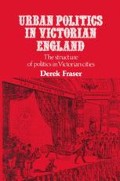Abstract
The Poor Law, contrary to a commonly held view, was both intrinsically political in itself and an important element in the urban political structure. Poor Law administration has normally been the province of social historians whose main interests tend to be methods of relief and social attitudes and who therefore ignore any political aspects. Much has recently been written on the nineteenth-century Poor Law but little light has been cast upon Poor Law politics. Similarly, recent interest in urban politics has steered clear of the Poor Law because of concentration upon elections, and so the Poor Law has been relegated to a sort of sub-political region. However, a great deal of local power was exercised within the Poor Law and the mode, aims and consequences of such execution of power was often controversial. The Poor Law provided a vehicle for local party combat and a contentious area of policy where rival interests and aspirations could conflict. Even the limited horizons of social administration were often politically determined, and this chapter will seek to reveal the ways in which the Poor Law was politicized.
‘Political party feeling prevails to a mischievous extent at Leeds, the parties are nearly balanced and it is scarcely possible to take any step in Leeds Township without exciting strong party feeling.’ Charles Mott, Assistant Poor Law Commissioner, 24 August 1841
Preview
Unable to display preview. Download preview PDF.
Notes
E. C. Midwinter, Social Administration in Lancashire 1830–1860 (1969), 18.
D. A. Farnie, `The Establishment of the New Poor Law in Salford 18881850’ (B. A. thesis, University of Manchester, 1951 ), 9.
R. L. Greenall, `The Development of Local Government fn Salford 18801853’ (M.A. thesis, University of Leicester 1970 ), 24.
T. J. Nossiter, `Shopkeeper Radicalism in the Nineteenth Century’, in Nossiter et al. (eds.), Imagination and Precision in the Social Sciences (1972), 407–38.
F. W. Rogers, `Local Politics and Administration in the Borough of Gateshead c. 1885-c. 1856’, (Ph.D. thesis, University of London, 1971 ), 214–60.
F. W. Rogers, ‘Gateshead and the Public Health Act of 1848’, Archaeologia Aeliana, XLIX (1971), 158.
P. J. Dunkley, `The New Poor Law and County Durham’ (M.A. thesis, University of Durham, 1971 ), 130.
R. Boyson, `The History of the Poor Law in North East Lancashire 1834–1871’ (M.A. thesis, University of Manchester, 1960) passim.
Leicester Chronicle 18 May 1839; A. T. Patterson, Radical Leicester (1954), 227.
Cf. D. Fraser, ‘Poor Law Politics in Leeds 1833–1855’, Publications of the Thoresby Society, LIII (1970), 23–49.
Author information
Authors and Affiliations
Copyright information
© 1976 Leicester University Press
About this chapter
Cite this chapter
Fraser, D. (1976). The Poor Law. In: Urban Politics in Victorian England. Palgrave, London. https://doi.org/10.1007/978-1-349-05137-3_4
Download citation
DOI: https://doi.org/10.1007/978-1-349-05137-3_4
Publisher Name: Palgrave, London
Print ISBN: 978-0-333-27885-7
Online ISBN: 978-1-349-05137-3
eBook Packages: Palgrave History CollectionHistory (R0)

